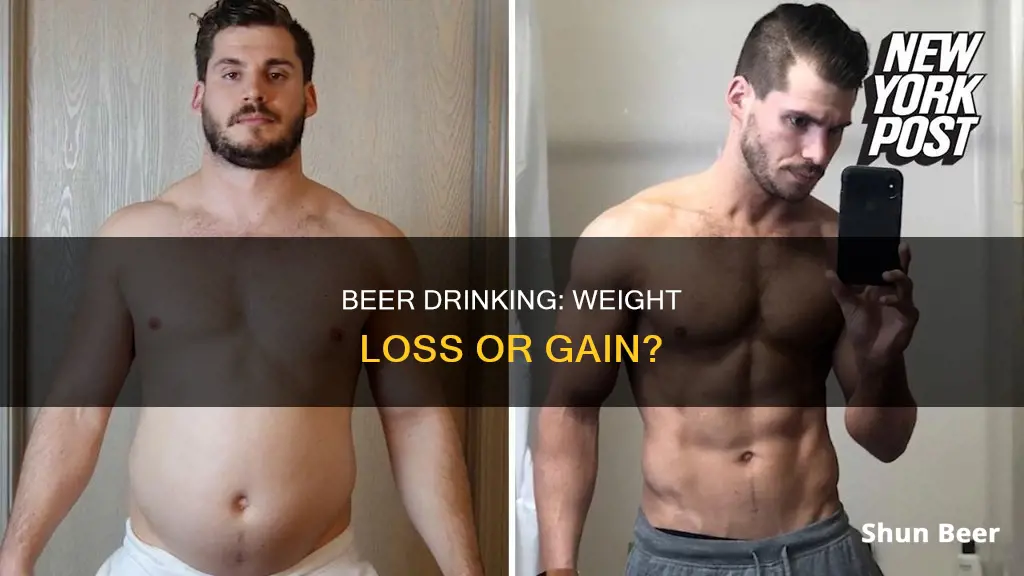
Beer and weight loss are not mutually exclusive. While beer is often associated with weight gain, it is possible to lose weight while still enjoying a drink. Beer contains calories, and the higher the alcohol content, the more calories it will have. A typical beer has around 150 calories, but this can vary depending on the brand and type. For example, a craft beer like Blue Moon has 171 calories, while a light beer has around 100 calories. To lose weight, you need to burn more calories than you consume, so drinking beer in moderation and being mindful of the calorie content can help you stay within a healthy range. Additionally, switching to light beers or low-percentage ABV beers can reduce your calorie intake. However, it's important to note that alcohol is often considered “empty” calories, providing your body with energy but few nutrients. Alcohol can also affect your liver, hormones, sleep, and digestion, all of which play a role in weight management.
| Characteristics | Values |
|---|---|
| Calories in a beer | 150-171 calories |
| Calories in a light beer | 103 calories |
| Calories in a craft beer | 171-200 calories |
| Calories in a low-calorie mixer | 100 calories |
| Recommended calorie intake for women | 1,600-2,400 calories per day |
| Recommended calorie intake for men | 2,000-3,000 calories per day |
| Moderate drinking for men | 1-2 drinks per day |
| Moderate drinking for women | Up to 1 drink per day |
What You'll Learn

Beer contains calories, with one beer containing 153 calories
Beer is made from fermented grains, and the calories in beer come mainly from carbs and alcohol. The number of calories in beer varies depending on the type of beer and its alcohol content. A typical beer has around 150 calories, but this can range from around 95 to 300 calories per serving. The USDA lists one beer as containing 153 calories, while a craft beer can contain over 170 calories.
Beer can contribute a lot of calories, which can make it challenging for those trying to manage their weight. The higher the ABV, the higher the calories, so beer brewing and the resulting ABV will determine the caloric content. Craft, seasonal, and high-alcohol beers tend to have more calories than lighter beers. If you're watching your calorie intake, opting for alcohol-free or low-alcohol beers can be a good choice, as these typically have fewer calories.
When trying to lose weight, many people cut out alcohol because it contains extra calories. Beer and weight gain often go hand-in-hand, especially when combined with calorie-rich food. Alcohol also reduces inhibitions and stimulates your appetite, leading to increased food consumption. According to a study in the American Journal of Public Health, alcohol consumption is linked to weight gain and obesity.
However, it is possible to drink beer and still lose weight. Reducing portion sizes, drinking less frequently, and choosing lower-calorie or lower-carb beers can help. Switching to light beer can be a good option, as it has fewer calories and carbohydrates than regular beer. Additionally, drinking water before, during, and after consuming alcohol can help prevent dehydration and maintain physical activity levels.
Drinking and Driving: One Beer, Still Safe to Drive?
You may want to see also

Alcohol is often referred to as empty calories
Alcoholic drinks are often referred to as "empty calories" because they provide little to no nutritional value. Alcohol is high in calories—a typical beer contains around 150 calories—and these calories are usually additional to those consumed as part of a person's regular diet, leading to weight gain.
The body prioritises processing alcohol over other nutrients and fat. As the body cannot store alcohol, it must metabolise it to eliminate it, which interrupts other processes such as absorbing nutrients and processing fat. This means that the body is more likely to store fat, particularly around the middle, leading to the infamous "beer belly".
Alcohol also inhibits the absorption of vital nutrients, including thiamin (vitamin B1), vitamin B12, folic acid, and zinc. It disrupts the water balance in muscle cells, affecting their ability to produce adenosine triphosphate (ATP), the energy source for muscles. Alcohol further reduces energy sources by inhibiting gluconeogenesis, a process by which glucose is formed from substances other than glucose.
Alcoholic drinks are also often high in sugar, further contributing to their calorie count. A pint of lager contains roughly the same amount of calories as a standard slice of pizza, and a large glass of wine (250ml) has the same number of calories as a typical ice cream sundae.
As such, reducing alcohol consumption can help maintain a healthy weight.
Beer Left Outside: Still Refreshing or a Disaster?
You may want to see also

Alcohol is burned first as a fuel source before your body uses anything else
Alcohol and weight gain often go hand in hand. Beer, for instance, contains a significant number of calories—a typical beer has 150 calories, while a craft beer can have 171 or even over 200 calories. Alcohol also reduces your inhibitions and stimulates your appetite, often leading to overeating.
When you consume alcohol, your liver burns it instead of fat. This is because alcohol is burned first as a fuel source before your body uses anything else. This is why drinking beer and losing weight don't usually go together. If you're trying to lose weight, it's best to cut down on your alcohol consumption and opt for lower-calorie beverages.
Alcohol, specifically ethanol, has been used as a fuel for centuries. It was first isolated from wine around 1100 and found to burn soon after. Ethanol has been used for lamp oil, cooking, and even fuel for cars and other machinery. Today, various alcohols, including methanol, ethanol, propanol, and butanol, are used as fuel for internal combustion engines.
While alcohol can be a good fuel source, it's important to note that it has a lower energy density than traditional fuels like gasoline and diesel. This means that you need more alcohol to generate the same amount of energy. Additionally, alcohol has a low flash point, making it extremely flammable and quick to catch fire. Proper ventilation is crucial when burning alcohol to ensure adequate oxygen availability and prevent carbon monoxide buildup.
Beer and Aspirin: A Safe Mix?
You may want to see also

Alcohol can increase your appetite
Alcohol is a calorie-dense organic compound, with 7 calories per gram, which is nearly as dense as fat. However, instead of contributing to a feeling of fullness, alcohol boosts the appetite.
Firstly, alcohol suppresses the oxidation of fatty acids, which are essential for appetite regulation. Secondly, it increases thermogenesis, or calorie utilisation, causing heat production, which means you may feel hungry again faster than usual. Thirdly, alcohol stimulates or inhibits neurochemical systems that play a role in appetite regulation. Research has shown that alcohol affects two primary hunger-regulating hormones: Leptin and GLP-1. These hormones suppress appetite and are inhibited when alcohol enters the body, resulting in feelings of hunger.
Alcohol also stimulates the same neurons in the brain that are triggered when the body goes into starvation mode, which can lead to ethanol-induced overeating. In addition, alcohol reduces self-control, making it more likely that people will indulge in food cravings and overeat.
Several studies have found that alcohol increases energy intake, with one study of 14 participants finding that alcohol inhibits the secretion of the hormone Leptin, which inhibits hunger and makes us feel full. Another study of eight subjects found that alcohol decreased the amount of ghrelin, the "hunger hormone", in the blood.
However, the effect of alcohol on appetite is complex and multivariable. While alcohol can increase energy intake, it does not seem to increase general hunger. Instead, it increases hunger once eating has begun.
The variety of alcoholic drinks also plays a role, as some are bubbly, sweet, or savoury, and these aspects could inhibit or stimulate appetite. For example, you may associate red wine with good meals and be predisposed to eat more when drinking it. On the other hand, you may associate champagne with New Year's Day hangovers and be put off your meal.
The cultural association between drinking and eating also plays a role, as drinking is often associated with eating less healthy foods.
Beer and Painkillers: How Does Ibu Work?
You may want to see also

Lower testosterone levels may affect the quality of sleep, especially in older men
It is possible to lose weight while still drinking beer, but it is challenging. Beer is high in calories, and alcohol reduces inhibitions and stimulates the appetite, leading to increased calorie consumption. Beer is also often accompanied by calorie-rich foods such as pizza, wings, and fried foods. To lose weight, one must burn or cut around 500 calories a day, so switching to light beer or reducing portion sizes can help lower calorie intake. Additionally, increasing exercise, changing one's diet, and monitoring alcohol consumption are crucial for weight loss while drinking beer.
Lower Testosterone Levels and Sleep Quality in Older Men
Testosterone is a crucial hormone for both men and women, influencing mood, bone strength, and sleep cycles. Lower testosterone levels can disrupt sleep, particularly in older men. Testosterone levels follow a circadian rhythm, rising during sleep and peaking during the REM sleep cycle. However, older men experience a decline in testosterone levels, which can affect their sleep quality.
Studies have shown that insufficient sleep, or less than 7-9 hours per night, can lead to lower testosterone levels, impacting overall health and energy levels. Sleep deprivation can cause a significant decrease in testosterone production, and the relationship between the two is bidirectional. Lack of sleep reduces testosterone, and low testosterone can cause or worsen insomnia.
Additionally, as testosterone levels drop, cortisol levels, the body's primary stress hormone, increase. Cortisol enhances alertness, leading to shorter sleep cycles and shallower sleep. This disruption in sleep architecture can further impact testosterone levels.
To improve sleep quality and increase testosterone levels, maintaining a healthy weight, practicing good sleep habits, and treating conditions like sleep apnea are recommended.
Beer and Augmentin: Safe Mix?
You may want to see also
Frequently asked questions
Yes, but it is harder to create a caloric deficit if you drink every day. If you are trying to lose weight, you can reduce calories and still enjoy a cold one from time to time.
To lose weight, you need to burn more calories than you consume. You can do this by drinking light or low % ABV beer, reducing your portion size, drinking less frequently, and choosing lower-carb beers.
Alcohol is often referred to as "empty" calories, providing your body with calories but very few nutrients. It is also burned first as a fuel source before your body uses glucose from carbohydrates or lipids from fats, which can lead to weight gain.
Moderate alcohol consumption (1 drink per day for women) increases your HDL (good) cholesterol, and studies show that people who have a couple of drinks each week live longer.







